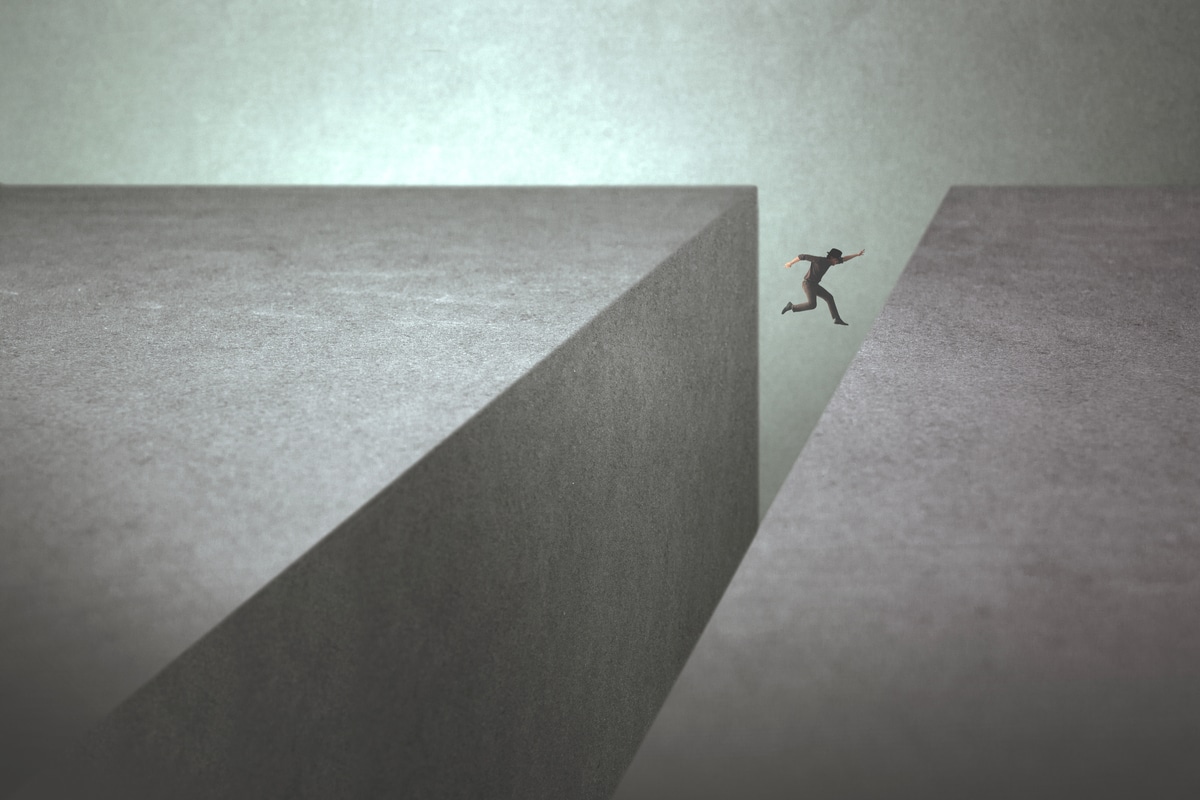Letting go of guilt can be difficult, but it’s not impossible.
Guilt is a common emotion that we all experience at some point in our lives. It can be caused by many different things, such as making a mistake, hurting someone’s feelings, or not meeting our own high standards.
Left unchecked, guilt can eat away at our peace of mind and prevent us from moving on.
But if you’re struggling with letting go of guilt, know that you’re not alone.
Many people feel burdened by guilt and have trouble forgiving themselves. However, it is possible to let go of guilt and move on with your life.
To start, it’s important to understand what guilt is and what causes it. Once you have a better understanding of your guilt, you can begin to work on forgiving yourself and letting go of the past.
What Is Guilt?
Guilt is an emotion we feel when we believe we’ve done something wrong. It’s a sense of responsibility or remorse for our actions. Guilt can also be accompanied by other negative emotions, such as shame, anxiety, and sadness.
Guilt is often self-inflicted, meaning we are more likely to feel guilty about our actions than anyone else is. This is because we have our own standards and expectations for ourselves, and when we don’t meet these standards, we often feel guilty.
Guilt can also be caused by outside factors, such as the actions of others. For example, you may feel guilty if your friend gets hurt because of something you did.
Guilt can be healthy if it motivates us to make changes in our lives or apologize for our mistakes. However, guilt can be harmful if it’s left unchecked, leading to anxiety, depression, and self-destructive behaviors.
What Are The Types Of Guilt?
Generally speaking, there are three types of guilt: reactive, anticipatory, and existential.
Reactive guilt is feeling guilty after acting after your own personal beliefs of right and wrong.
Anticipatory guilt is feeling guilty before acting out of fear of potential consequences.
Existential guilt describes your feelings for general injustice.
All three types of guilt can be normal and healthy.
Is It Normal To Think About Past Mistakes?
Thinking about past mistakes is completely normal, but ruminating or obsessing over your mistakes can be harmful.
If you can’t stop thinking about a past mistake it could be more than simply feeling guilty, so it may be helpful to talk to a clinical psychologist or mental health professional.
What Causes Guilt?
There are many different causes of guilt. Here are some of the most common:
Making A Mistake
We all make mistakes. Whether it’s forgetting to do something important or accidentally hurting someone’s feelings, we’ve all been there.
Guilt is a natural response to making a mistake. It’s our brain’s way of saying, “Hey, you messed up. You should probably fix that.”
However, too much guilt can become a problem.
If you’re constantly beating yourself up over your past mistakes, it can lead to anxiety and depression. You may start to believe that you’re not good enough or that you don’t deserve happiness, and that can be harmful to your mental and emotional well-being.
Hurting Someone’s Feelings
Guilt is also a common response to harming someone, whether it’s intentional or not.
For example, you may feel guilty if you hurt your partner’s feelings or if you accidentally hit someone with your car.
This type of guilt is often accompanied by shame, which is an intense form of self-loathing.
Shame is the belief that we are bad, unworthy people. It’s the feeling that we don’t deserve love or forgiveness.
Feeling like you’ve done something wrong can be a difficult thing to deal with. However, it’s important to remember that everyone makes mistakes.
No one is perfect.
What’s important is that you learn from your past mistakes and try to do better in the future.
Not Meeting Your Own Standards
Sometimes, the person we’re hardest on is ourselves.
We all have high standards and expectations for ourselves. And when we don’t meet these standards, we can feel guilty.
This type of guilt is often self-inflicted and can lead to anxiety and depression.
If you’re constantly berating yourself for not being good enough, it’s important to take a step back and reassess your standards.
Are they realistic? Do they take into account your current situation? Would you talk that way to someone other than yourself? If not, it may be time to adjust your standards.
Thinking About What We Didn’t Do
Sometimes, we feel guilty about things we didn’t do or wish we hadn’t done.
This is called survivor guilt and it’s common among people who have gone through traumatic events, such as natural disasters or combat.
Survivor guilt is the belief that we could have or should have done more to prevent the event from happening. It’s the feeling that we could have saved more people or that we should have been able to do more.
This type of guilt can be damaging because it often leads to self-blame.
Instead of focusing on the things we did do, we focus on the things we didn’t do, which can lead to feelings of inadequacy and worthlessness.
What Are The Symptoms Of Guilt?
There are many different symptoms of guilt. Some people feel guilty all the time, even when they haven’t done anything wrong. Others only feel guilty occasionally, usually after making a mistake.
The symptoms of guilt can vary from person to person, but some common symptoms include:
- Feeling anxious or nervous;
- Feeling down or depressed;
- Having trouble sleeping;
- Losing interest in activities you used to enjoy;
- Avoiding people or situations that remind you of your mistake;
- Feeling irritable or angry;
- Overeating or undereating;
- Struggling to concentrate.
If you’re struggling with guilt, it’s important to talk to your doctor or mental health professional. They can help you understand your symptoms and provide you with treatment options.
What Are The Consequences Of Guilt?
Guilt can have many negative consequences on our lives. If you’re constantly feeling guilty, it can lead to:
Anxiety
Guilt is often accompanied by anxiety because we’re constantly worried about the consequences of our actions.
We may worry that we’ll be punished or that someone will find out about our mistakes, which can lead to anxiety and panic attacks.
Depression
Guilt can also lead to depression.
This is because we start to believe that we’re not good enough or that we don’t deserve happiness.
We may feel like we’re stuck in a never-ending cycle of self-loathing, which can be harmful to our mental and emotional well-being.
Self-Destructive Behaviors
In some cases, guilt can lead to self-destructive behaviors or even suicidal thoughts.
When we feel like we’re not good enough, we may turn to alcohol or drugs to numb the pain.
We may also engage in self-harm or risky behaviors because we believe that we don’t deserve happiness or love.
Relationship Problems
Guilt can also cause problems in our relationships.
When we’re constantly feeling guilty, we may withdraw from our loved ones. We may also become irritable and short-tempered, which can lead to fights and arguments with those closest to us.
Letting Go Of Guilt After Hurting Someone: The 7 Steps You Need To Take
Self-forgiveness is a process.
It takes time, effort, and patience. However, it’s important to remember that you’re worth the effort. You deserve to forgive yourself and move on with your life.
The following are seven steps to self-forgiveness:
1. Acknowledge Your Mistake
The first step in the healing process is acknowledging that you’ve made a mistake.
This can be difficult, but it’s important to face your mistakes head-on. Self-blame will only make the situation worse.
Be honest with yourself about what you did and how it made you feel. This will help you understand your mistake and start the process of forgiveness.
2. Understand Your Motivations
The next step is to understand your motivations for making the mistake.
What were you thinking or feeling at the time? Were you under stress? Did someone else influence your decision?
This step is important because it can help you to see your mistake in a different light. It can also help you understand why you made the mistake and prevent yourself from making the same mistake in the future.
3. Accept Responsibility
The third step is to accept responsibility for your actions.
This doesn’t mean that you’re a bad person, it just means that you’re human and that you made a mistake.
Accepting responsibility is an important part of the forgiveness process. It shows that you’re willing to take ownership of your actions and that you’re willing to make things right.
4. Make Amends
The fourth step is to make amends for your mistake.
This may involve making a sincere apology to the person you hurt, making restitution, or taking other steps to make things right.
When you make amends, it shows that you’re remorseful for your actions and that you’re willing to change, which can be an important step in the forgiveness process.
5. Learn From Your Mistake
The next step is to ensure that you learn from your mistake.
This means taking the time to reflect on what you did and why it was wrong, but also make a commitment to change your behavior in the future.
This step is important because it helps you prevent yourself from making the same mistakes again and again, and shows that you’re willing to grow as a person and learn from your mistakes.
6. Forgive Yourself
The sixth step is one of the hardest to take – it’s to forgive yourself.
This means letting go of the anger, shame, and guilt that you feel and accepting yourself for who you are.
This step is difficult, but it’s important to remember that you’re human and that you deserve forgiveness.
Forgiving yourself will help you move on from your mistake and live a happier, healthier life.
7. Move On
The seventh and final step is to move on from your mistake.
This means committing yourself to live a free life of guilt and shame. It also means letting go of the past and focusing on the present.
This step is important because it allows you to live a life that is free of guilt and pain. It also helps you to focus on the positive aspects of your life.
How To Forgive Yourself And Move On – Tips For Dealing With Guilt
Forgiving yourself and moving on can be two of the hardest steps to take. Here are a few ways you can work through your guilt, or reframe it, to become more accepting of your mistakes and forgiving of yourself.
Challenge Hindsight Bias
Hindsight bias is the tendency to see events that have already happened as being more predictable than they actually were, which can make it difficult to forgive yourself for making a mistake.
Try to remember that even though an event may seem obvious in hindsight, you didn’t know what was going to happen when you made the decision.
Challenge Perfectionism
Many people feel guilty because they think they should have been able to predict or prevent a negative event from happening. This can be especially true if you have high standards for yourself.
It’s important to remember that no one is perfect and that we all make mistakes. If you’re struggling to forgive yourself, try to remember that everyone makes mistakes and that it’s okay not to be perfect.
Talk To Someone
If you’re struggling to forgive yourself, it can be helpful to talk to someone who can understand and support you. This could be a friend, family member, therapist, counselor, or even a life coach.
Talking to someone can help you feel less alone and give you a chance to express how you’re feeling without fear of judgement.
Write It Down
Writing down your thoughts and feelings can be a helpful way to deal with guilt. It can help you to see your thoughts and feelings in a different light and can also be a way to release them.
Try journaling, writing a letter to yourself, or even just making a list of things you feel guilty about.
Seek Professional Help
If you’re struggling to deal with your guilt, it may be helpful to seek professional help.
A therapist, counselor or clinical psychologist can help you explore your thoughts and feelings and provide you with tools to deal with your guilt.
How To Let Go Of Guilt In A Relationship
If you’re in a relationship, it’s important to remember that guilt is a normal part of the human experience – we all make mistakes, and we all feel guilty at times.
The key to dealing with guilt in a relationship is communicating with your partner.
If you’re feeling guilty about something, talk to your partner about it. They may be able to help you to see the situation in a different light.
It’s also important to remember that forgiveness is a two-way street.
If your partner has done something to hurt you, they may also be feeling guilty. It’s important to forgive them and to move on from the situation.
Forgiving yourself and your partner will help to strengthen your relationship and create a more positive, healthy connection.
Guilty feelings can be a normal part of life, but they don’t have to control your life. If you’re struggling with guilt, remember to talk to your partner and seek professional help if needed.
When Should You Seek Help for Guilt?
Guilt can lead to mental health issues such as anxiety and depression. If you’re struggling to cope with your guilt, talk to your doctor or mental health professional. They can help you understand your thoughts and feelings and provide you with tools to deal with your guilt.
Professional help may be especially important if you’re struggling with survivor guilt or feel like you can’t forgive yourself for a past mistake. If you’re having suicidal thoughts, or are thinking of harming yourself or others, seek help immediately. Call a suicide hotline in your country.
Final Thoughts
No one is perfect. We all make mistakes. And while some mistakes are minor and easily forgotten, others can have a lasting impact on our lives.
Many of us struggle to forgive ourselves for our mistakes, but it’s important to remember that everyone makes them.
If you’re struggling to forgive yourself, try to challenge your thoughts and beliefs. Remember that no one is perfect and that we all make mistakes. Talk to someone who can understand and support you, or seek professional help if needed.
Most importantly, remember that not all guilt is bad.
Guilt can motivate us to change our behavior and make better choices in the future. It’s a moral compass that can help us to live a more fulfilling and meaningful life. So, don’t be too hard on yourself.
We all make mistakes. What matters is how we learn from them.
FAQs
Is It Possible To Let Go Of Guilt?
Yes, it is possible to let go of guilt. We all make mistakes, and no one is perfect. Guilt can be a normal and healthy emotion, but it’s important not to let it take over your life.
If you’re struggling to forgive yourself, try to challenge your thoughts and beliefs. Remember that everyone makes mistakes. Talk to someone who can understand and support you. Seek professional help if needed.
How Do You Forgive Yourself And Let Go Of Guilt?
The first step is acknowledging your mistake and accepting that you are not perfect. Everyone makes mistakes. Forgiving yourself is an important step in moving on from your past actions.
Do Feelings Of Guilt Go Away?
The feelings of guilt may go away on their own, or they may not. If you make a mistake, you may continue to feel guilty about it for a long time, even if you have forgiven yourself. If the guilt impacts your mental health, it may be helpful to seek professional help.
Can Guilt Cause Depression?
Yes, guilt can cause depression. According to studies, people who feel guilty are more likely to experience depression, and guilt can also lead to anxiety and other mental health issues.
What Are The 4 Rs Of Self-Forgiveness?
The 4 R’s of self-forgiveness are responsibility, remorse, restoration, and renewal. Responsibility means acknowledging your mistake and taking responsibility for your actions. Remorse is feeling sorry for what you did. Restoration is making things right, if possible. Renewal is moving on from your mistake and creating a new beginning.













